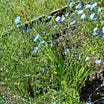Great-grandson to ᐸᐦᐹᐢᑌᐤ pahpâstêw and long-time resident of Boyle Street and McCauley ᑳᐯᓵᑳᐢᑌᐠ reuben quinn is publishing a new resource for teaching and learning ᓀᐦᐃᔭᐁᐧᐃᐧᐣ nêhîyawewin (Cree).
ᑭᐢᑭᓱᒥᑐᐠ kiskisomitok: ᓀᐦᐃᔭᐤ to remind each and one another will be launched at Paper Birch Books (10825 95 St) at 1 pm on July 24, accompanied by a pipe ceremony and feast.
Born in St. Paul, Alberta, quinn was a Day Scholar at Blue Quills University. He had learned his mother tongue in his home community.
He experienced severe hearing loss as a child, later corrected by surgery. This hearing loss, which he terms “fortune from misfortune,” meant he did not lose his ability to articulate nêhîyawewin (Cree) as a native speaker.
As a young man he worked with young offenders, and was tasked with including culture in their programs. At that time, he began to develop his teaching method, using spirit marker writing system as a foundation for teaching ᓀᐦᐃᔭᐁᐧᐃᐧᐣ nêhîyawewin (Cree).
For a time, quinn taught language classes with the Centre for Race and Culture in Edmonton. He was promised that his intellectual property would be respected, returned, and compensated. He says that this promise is unfulfilled to this day, which reuben states “is another act of colonialism.”
At the University of Alberta, he co-taught the Poetics of Treaty Six with Dr. Christine Stewart. The two collaborated in getting this latest book to print. quinn emphasises, “without her [Dr. Stewart], there is no book. That’s the truth of it.”
quinn has been a ceremony person and Lodge Keeper, and points out that he does not consider himself a fluent speaker. Many words have been lost and the language lexicon has shrunk significantly.
The book, he hopes, can serve as a “beacon for young Indigenous people” many of whom have lost language and culture from the “vestiges of colonialism” including the legacy of residential schools, the Sixties Scoop, and even earlier government policies that outlawed spiritual and religious ceremonies.
“In order to destroy culture, belief systems need to be undermined, separating people from their spiritual foundations. You will see Catholic or Protestant churches in communities, and some people are not aware of their traditional religions and have lost the words that relate to their Creator. This colonial practice was not isolated to North America, it has been used on both sides of the water,” he says.
According to the description on the publisher's (Talon Books) website: “Each spirit marker holds a law. These laws are meant to guide us in ways that support us in life. They are meant to guide us in ways of living well with the elements: fire, land, water, and air. The spirit markers remind us that these elements form the foundations of all relationships on earth.”
rueben welcomes all to use this resource for learning nêhîyawewin (Cree) language grounded in culture. “Learning this way (through the spirit markers) can create a shift in our understanding of ourselves, and our relationships.”
Books will be available for sale at the launch.
(Editor’s Note: reuben quinn prefers his name to be presented in lower case as an act of sovereignty.)







